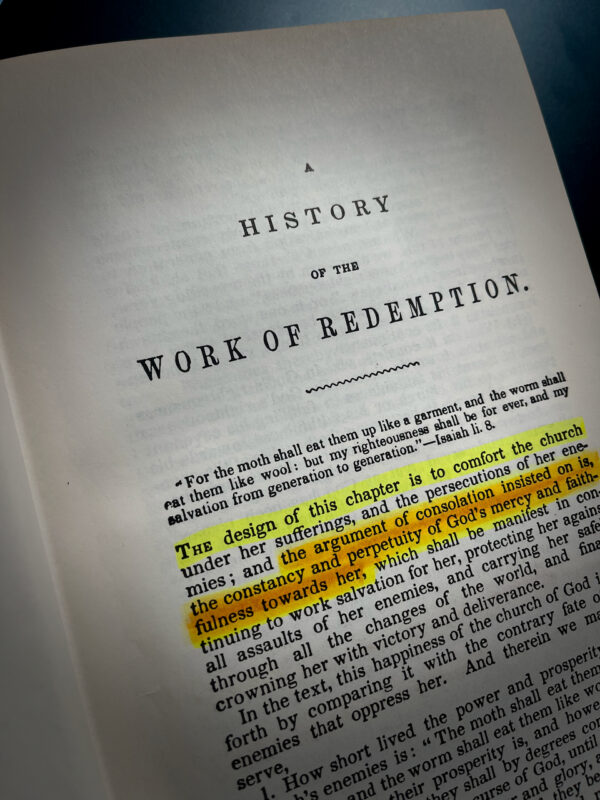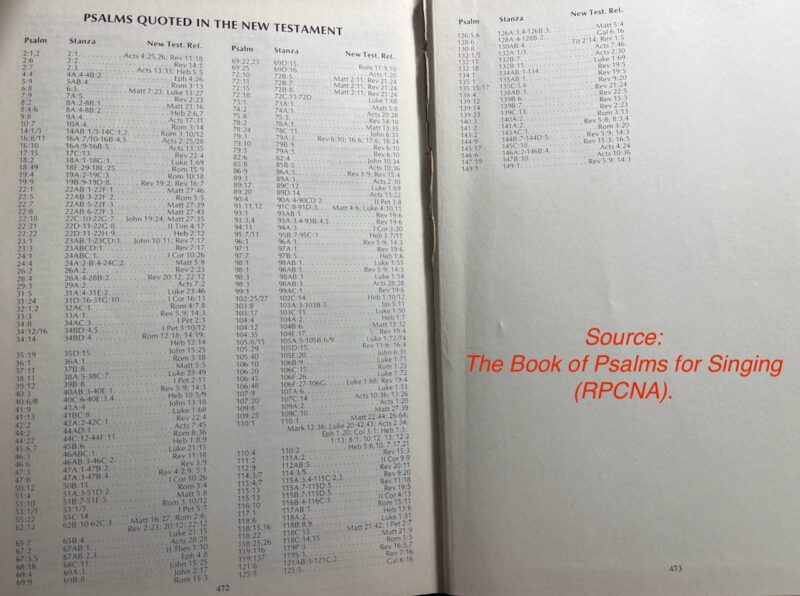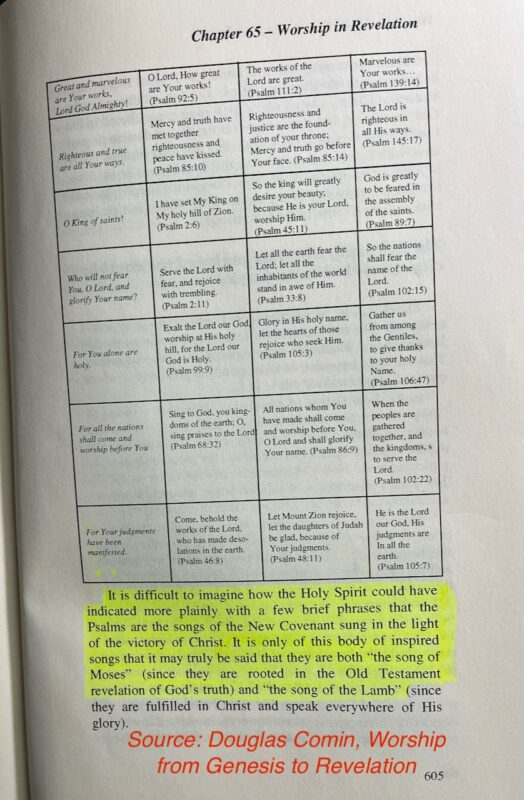

Dearly Beloved,
Last Lord’s Day, during my morning sermon about the rejoicing which Deuteronomy 12 expresses as a theme and result of recovering God’s prescribed worship regulations, I shared a few excerpts from Jonathan Edwards’ book, The History of the Work of Redemption, in which he extols God’s giving His church the Psalms for singing to Him as an incredibly joyous part of redemptive history.
Edwards introduces this section saying, “Another thing God did … was his inspiring David to show forth Christ and his redemption, in divine songs, which should be for the use of the church, in public worship, throughout all ages …” What will follow shows that he intends to include our time and always after in “all ages” of church worship.
Notice, Edwards doesn’t argue against the anomaly of modern hymns and praise tunes, because he wouldn’t have needed to then. The Reformation had recovered the New Testament church and ancient Christianity’s Spiritual songbook God wrote for His redeemed to praise Him throughout all history. So by Edwards’ time, exclusive psalmody in church worship would have again been the norm for nearly all Protestant churches (it is a factual aberration in church history to sing other than the Psalms).
Jonathan Edwards is considered by the likes of R.C. Sproul and his mentor John Gerstner to still be one of the best ever American minds (theological or otherwise). We have in his History of Redemption an edited collection of his sermon manuscripts preached as a “biblical theology” series in 1739. He did not complete it before he died very shortly after becoming Princeton’s president in 1758, but his son by the same name published them as this book in New Haven, Connecticut, in 1773—well before then, the very first book published in the American Colonies was The Bay Psalm Book, issued in Cambridge, Massachusetts in 1640, because churches were singing the Psalter. (By the way, the popular tune many churches use today singing the “Doxology” is the “Old 100th” for Psalm 100 borrowed from Calvin’s Genevan Psalter published in 1562.)
Thus, Edwards simply praises the Holy Spirit for writing the Psalms for God’s Church to begin praising Him with at this epoch of Redemptive history which he and his church then enjoyed as we by God’s grace do today.
I trust you will recall that the “spiritual songs” (simply a categorical term used in sections of the Psalms themselves) which Paul references in Eph. 5:19 and Col. 3:16 must be understood non-anachronistically and in the light of 2 Tim. 3:16 and 2 Pet. 1:21—all Scripture, including its songs, is inspired by God and profitably written for the people of God by its one Author, the Holy Spirit.
An objection to singing the Psalter in worship I’ve often heard by even evangelical and Reformed Christians is that they want to sing man-made songs because, according to them, the Psalms—though written by God, don’t sing about Jesus. Of course, Jesus says they most certainly do in Luke 24:44: … These are the words which I spake unto you, while I was yet with you, that all things must be fulfilled, which were written in the law of Moses, and in the prophets, and in the psalms, concerning me.


As well, earlier in vs. 27, for the benefit of the men with whom Jesus walked to Emmaus and then revealed it was He the risen Christ who broke the bread of fellowship before their eyes, …beginning at Moses and all the prophets, he expounded unto them in all the scriptures the things concerning himself. “All the prophets” in all the Scriptures concerning Jesus includes the Psalms, for remember what Peter proclaimed in his great Pentecost sermon in Acts 2:30-32: Therefore being a prophet, and knowing that God had sworn with an oath to him, that of the fruit of his loins, according to the flesh, he would raise up Christ to sit on his throne; He seeing this before spake of the resurrection of Christ, that his soul was not left in hell, neither his flesh did see corruption. This Jesus hath God raised up, whereof we all are witnesses. What source was Peter mostly preaching from and quoting here as David’s prophecy about Christ’s resurrection? Psalm 16:9-11, and almost the whole Psalm in its entirety throughout the sermon found in chapter two (he also uses Psalm 110:1, which of course is soon followed by verse 4 about Jesus being the high priest after the order of Melchizedek, which the letter to the Hebrews constantly quotes of Him).
Thus, notice how much Edwards recognizes the Psalms speak of Christ in a special way more than anything in the Old Testament.
The way that th[e] Spirit influenced [David] was, to inspire him to show forth Christ, and the glorious things of his redemption, in divine songs, sweetly expressing the breathings of a pious soul, full of admiration of the glorious things of the Redeemer, inflamed with divine love, and lifted up with praise; and therefore he is called the sweet psalmist of Israel. 2 Sam. xxiii. 1.
The main subjects of these sweet songs were the glorious things of the gospel ; as is evident by the interpretation that is often put upon them, and the use that is made of them in the New Testament ; for there is no one book of the Old Testament that is so often quoted in the New, as the book of Psalms. Joyfully did this holy man sing of those great things of Christ’s redemption, that had been the hope and expectation of God’s church and people from the beginning of the church of God on earth; and joyful did others follow him in it, as Asaph, Heman, Ethan, and others …


… before there was but here and there a prophecy given of Christ in a great many ages, now here Christ is spoken of by his ancestor David abundantly, in the multitudes of songs, speaking of his incarnation, life, death, resurrection, ascension into heaven, his satisfaction, intercession; his prophetical, and priestly office; his glorious benefits in this life and that which is to come; his union with the church, and the blessedness of the church in him; the calling of the Gentiles, the future glory of the church near the end the world, and Christ’s coming to the final judgment. All these things, and many more, concerning Christ and his redemption, are abundantly spoken of in the book of Psalms.
This was also a glorious advancement of the affair of redemption, as God hereby gave his church a book of divine songs for their use in that part of their public worship … singing his praises, throughout all ages to the end of the world. It was manifest the book of Psalms was given of God for this end …
So David is called the sweet psalmist of Israel, because he penned psalms for the use of the church of Israel ; and accordingly we have an account of Israel for that end, even ages after David was dead ; as 2 Chron. xxix. 30.
… the same are appointed in the New Testament to be made use of in the Christian church, in their worship … Eph. v. 19 … Col. iii.16 … And so they have been, and will to the end of the world be made use of in the church to celebrate the praises of God … now first did God commit to his church a book of divine songs for their constant use.
As I taught in our class through the Westminster Confession of Faith, the Westminster Assembly also produced a metrical Psalter only with the 150 Psalms, and it was later revised in Scotland and became the Scottish Psalter of 1650, which our Comprehensive Psalter is with various new tunes and formatting. Our Westminster Confession of Faith and its Directory for the Publick Worship of God only speak of psalm singing for worship. If you’d like to review my lecture with more exegesis and historical analysis to explain exclusive psalmody in our worship, Click Here, where you can both listen and read along. Included in the pdf file is a link to an article by my preaching professor, Dr. Dennis Prutow (now with the Lord), demonstrating that the songs in Revelation are reflective parts of the Psalms (see also Douglas Comin’s, Worship from Genesis to Revelation, chapter 65, “Worship in Revelation,” that includes a chart to demonstrate the songs in Revelation are parts of the OT Psalms).
May we have ears to hear what the Spirit says to the church as is said in the Psalms themselves and also by David in 1 Chronicles 16:9: Sing unto him, sing psalms unto him, talk ye of all his wondrous works.
Semper Reformanda,
Pastor Grant
To read for yourself, see Jonathan Edwards, The History of Redemption, (Grand Rapids: Associated Publishers and Authors Inc., date?), 98-100.

